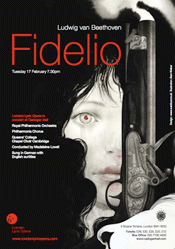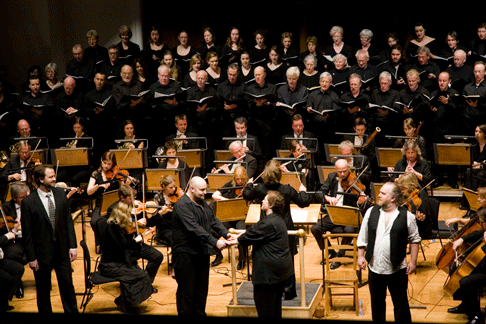
08 Mar 2009
Fidelio — London Lyric Opera, Cadogan Hall
After a problematic debut last Autumn with Der fliegende Holländer at the Barbican, London’s newest opera-in-concert outfit returned this month with Fidelio at the smaller Cadogan Hall.
English Touring Opera are delighted to announce a season of lyric monodramas to tour nationally from October to December. The season features music for solo singer and piano by Argento, Britten, Tippett and Shostakovich with a bold and inventive approach to making opera during social distancing.
This tenth of ten Live from London concerts was in fact a recorded live performance from California. It was no less enjoyable for that, and it was also uplifting to learn that this wasn’t in fact the ‘last’ LfL event that we will be able to enjoy, courtesy of VOCES8 and their fellow vocal ensembles (more below …).
Ever since Wigmore Hall announced their superb series of autumn concerts, all streamed live and available free of charge, I’d been looking forward to this song recital by Ian Bostridge and Imogen Cooper.
The Sixteen continues its exploration of Henry Purcell’s Welcome Songs for Charles II. As with Robert King’s pioneering Purcell series begun over thirty years ago for Hyperion, Harry Christophers is recording two Welcome Songs per disc.
Although Stile Antico’s programme article for their Live from London recital introduced their selection from the many treasures of the English Renaissance in the context of the theological debates and upheavals of the Tudor and Elizabethan years, their performance was more evocative of private chamber music than of public liturgy.
In February this year, Albanian soprano Ermonela Jaho made a highly lauded debut recital at Wigmore Hall - a concert which both celebrated Opera Rara’s 50th anniversary and honoured the career of the Italian soprano Rosina Storchio (1872-1945), the star of verismo who created the title roles in Leoncavallo’s La bohème and Zazà, Mascagni’s Lodoletta and Puccini’s Madama Butterfly.
Evidently, face masks don’t stifle appreciative “Bravo!”s. And, reducing audience numbers doesn’t lower the volume of such acclamations. For, the audience at Wigmore Hall gave soprano Elizabeth Llewellyn and pianist Simon Lepper a greatly deserved warm reception and hearty response following this lunchtime recital of late-Romantic song.
Collapsology. Or, perhaps we should use the French word ‘Collapsologie’ because this is a transdisciplinary idea pretty much advocated by a series of French theorists - and apparently, mostly French theorists. It in essence focuses on the imminent collapse of modern society and all its layers - a series of escalating crises on a global scale: environmental, economic, geopolitical, governmental; the list is extensive.
For this week’s Live from London vocal recital we moved from the home of VOCES8, St Anne and St Agnes in the City of London, to Kings Place, where The Sixteen - who have been associate artists at the venue for some time - presented a programme of music and words bound together by the theme of ‘reflection’.
'Such is your divine Disposation that both you excellently understand, and royally entertaine the Exercise of Musicke.’
Amongst an avalanche of new Mahler recordings appearing at the moment (Das Lied von der Erde seems to be the most favoured, with three) this 1991 Mahler Second from the 2nd Kassel MahlerFest is one of the more interesting releases.
‘And there was war in heaven: Michael and his angels fought against the dragon; and the dragon fought and his angels, And prevailed not; neither was their place found any more in heaven … that old serpent … Satan, which deceiveth the whole world: he was cast out into the earth, and his angels were cast out with him.’
If there is one myth, it seems believed by some people today, that probably needs shattering it is that post-war recordings or performances of Wagner operas were always of exceptional quality. This 1949 Hamburg Tristan und Isolde is one of those recordings - though quite who is to blame for its many problems takes quite some unearthing.
There was never any doubt that the fifth of the twelve Met Stars Live in Concert broadcasts was going to be a palpably intense and vivid event, as well as a musically stunning and theatrically enervating experience.
‘Love’ was the theme for this Live from London performance by Apollo5. Given the complexity and diversity of that human emotion, and Apollo5’s reputation for versatility and diverse repertoire, ranging from Renaissance choral music to jazz, from contemporary classical works to popular song, it was no surprise that their programme spanned 500 years and several musical styles.
The Academy of St Martin in the Fields have titled their autumn series of eight concerts - which are taking place at 5pm and 7.30pm on two Saturdays each month at their home venue in Trafalgar Square, and being filmed for streaming the following Thursday - ‘re:connect’.
The London Symphony Orchestra opened their Autumn 2020 season with a homage to Oliver Knussen, who died at the age of 66 in July 2018. The programme traced a national musical lineage through the twentieth century, from Britten to Knussen, on to Mark-Anthony Turnage, and entwining the LSO and Rattle too.
With the Live from London digital vocal festival entering the second half of the series, the festival’s host, VOCES8, returned to their home at St Annes and St Agnes in the City of London to present a sequence of ‘Choral Dances’ - vocal music inspired by dance, embracing diverse genres from the Renaissance madrigal to swing jazz.
Just a few unison string wriggles from the opening of Mozart’s overture to Le nozze di Figaro are enough to make any opera-lover perch on the edge of their seat, in excited anticipation of the drama in music to come, so there could be no other curtain-raiser for this Gala Concert at the Royal Opera House, the latest instalment from ‘their House’ to ‘our houses’.
"Before the ending of the day, creator of all things, we pray that, with your accustomed mercy, you may watch over us."

After a problematic debut last Autumn with Der fliegende Holländer at the Barbican, London’s newest opera-in-concert outfit returned this month with Fidelio at the smaller Cadogan Hall.
And what an improvement it was — the fundamental difference being that the most important roles were strongly cast. As Leonore, Elizabeth Connell wielded her steely-centred soprano with a confidence that was equal to the dramatic demands of the role without compromising on lyricism and good classical technique. Her physical characterisation was less convincing; her Fidelio was introverted, diffident and tentative until it came to the critical moment of the rescue. Leonore must surely have had to be convincing enough as a strapping youth to convince both Rocco and Marzelline of her credentials; here she never quite disguised the persona of the desperately worried wife.
The tenor Jeffrey Lloyd-Roberts sang Florestan; his voice is oversized in a small hall, but this only heightened the impact of his emotionally powerful performance. The commitment in his singing was second to none, even if it made his vocal delivery rather ragged around the edges. Without the benefit of a fully staged production, it was his performance which brought to life not only the character but the whole scenario.
The interplay between Rachel Nicholls’ Marzelline and Andrew Staples’ Jaquino drew affectionate laughter from the audience. Staples’ delivery is lucid and direct, while Nicholls soprano is perhaps overly rich and creamy for this role but a gorgeous, bright sound nonetheless.
Richard Wiegold, a young singer still, had the fatherly demeanour for Rocco and an attractively projected bass.
The weak point, I’m afraid, remained the baritone James Hancock (the company’s founder) as Pizarro. Although Beethoven gives him comparatively little to sing, thus limiting the impact of his performance on the concert, his blustering, characterless singing in imperfect German could not help but be shown up by the high-quality surrounding cast. Surely there is a major flaw in his strategy here?
 [Photo by Moz Bulbeck]
[Photo by Moz Bulbeck]
The young conductor Madeleine Lovell was polished and assured in her direction of the Royal Philharmonic Orchestra; the overture was robust and lyrical, the arias sensitively accompanied and the big dramatic climaxes powerfully realised. The collective vocal strength of the Philharmonia Chorus, galvanised by Cambridge’s Queen’s College Chapel Choir, gave them a pleasingly ‘operatic’ timbre so often missing from concert choirs.
It was certainly in a different league to that very disappointing Dutchman, better on almost every level.
Ruth Elleson © 2009